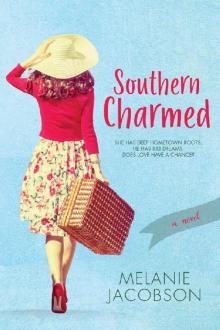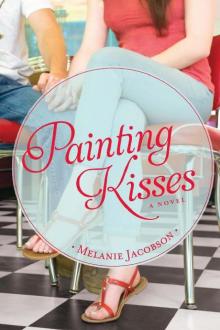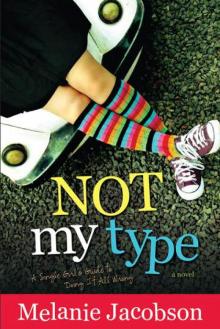- Home
- Melanie Jacobson
Wedding Belles: A Novel in Four Parts Page 2
Wedding Belles: A Novel in Four Parts Read online
Page 2
He hacked at the slab again, working faster. How was he going to break in here? Zak Choi’s Epic Plan to Take the Charleston Food Scene By Storm was off to a sputtering start.
He finished up the slab and braced himself against the counter, drawing a calming breath. Still easier than New York. At least in Charleston he wasn’t facing a million dollar start up hurdle along with everything else.
And he had this food truck. It wasn’t the fine dining restaurant he dreamed of in his increasingly distant future, but it was good food—amazing food—and it gave him the grim satisfaction of sticking it to the tradition-worshipping event planners and gatekeepers who spoke of Lowcountry food like it was a religious experience.
Maybe it was, but it was that really boring kind of religion where an old priest said stuff in Latin and everyone repeated it because that’s what they’d always done.
“I’ll take them to church,” he growled, grabbing the braising sauce for the ribs. “But it’s going to be one of those whooping and hollering religious experiences.” He dipped his finger in and tested it, smiling as the flavor burst on his tongue. “That right there will save your soul.”
There wasn’t anyone to agree or disagree with him. He hadn’t been able to afford an employee yet. It would happen soon, though. He could almost taste it, success as sweet as one of his galbi platters. All it would take was the right person posting about it in the right forum and then the word would get out about the “freshest” taste in town.
He moved down the stainless steel counter to prep the octopus and chili paste for the nakji bokkeum. An hour later he had the windows open, ready for business. He had to keep it simple since he was a one-man operation, but he’d chosen five dishes that only required a little assembly. Today he’d added one new dish he was calling simply Seoul Grits. It was how he imagined the flavor explosion if Korea and South Carolina sailed toward each other at full speed and collided in the middle of the ocean.
Instead of hominy, which is what made southern grits, he used buckwheat boiled in lemon water to give the flat, nutty taste some layers. Then he had skewers of fat prawns marinated in honey garlic ready for flash grilling over the gas range that was already making the truck’s interior uncomfortably warm.
Now all he needed was the customers.
The food truck frenzy hadn’t taken hold of Charleston’s imagination the way it had in other cities, but they were definitely around. He watched through the window as the only other food truck on the block, a sandwich vendor, worked through a line six deep. A couple of people glanced his way, but none of them came over.
Come on, come on, come on.
After fifteen minutes without traffic, he put the skewers back on ice to keep them from spoiling and turned down the heat on the range.
Eventually, a portly middle-aged man who’d stopped by before walked up to the window. Zak gave him a big smile. “Hey, back for more?”
The man nodded, not smiling. “That short rib taco I got last time was something else.”
“Glad you liked it. How about today’s special? It’s a Korean shrimp and grits.”
“That’s what you are? Korean?” the man asked. “I don’t think I know any other Koreans.”
“My father’s parents are still in Korea, but he grew up here. And my mom is white. From Maine. So I think that just makes me American.”
The man gave a small grunt. “Korean. American. Whatever. I’ll take the special.”
Zak took his money and turned the grill up then dished up the Seoul grits while the shrimp sizzled over the flame. Four minutes later he plated them neatly on top of the buckwheat and garnished it with curls of radish before he handed it to the man.
He took a bite, chewed, and nodded. “Korean shrimp and grits. Good.”
“Thanks, man. And if you get a chance, could you post a review on the social media site of your choice? I’m trying to get my name out there.”
“I don’t fool with that stuff,” the man said around a mouthful of grits before he shuffled off in the direction of some office buildings.
“Glad you loved it,” Zak called after him loudly, hopeful that some people in the long sandwich line would opt for his shorter wait instead. It worked to the tune of three more satisfied customers who all promised to give him a shout out on their social media. One even took a picture of his food before he ate it, and it made Zak half hope the review would happen. Nothing was better for business than foodie hipsters, and this guy had ugly enough glasses that he might be a hipster.
He only ended up with a dozen customers even though he kept his window open an hour after the sandwich truck drove off. He was pulling out storage containers for the unused food when a lilting voice called through the window, “I’ll take the special, please.”
He turned with a smile that collapsed as soon as he spotted the owner of the pleasant voice. Harper Day of Great Day Events and coq au vin fame. “Did I leave something in your office?” he asked, turning back to his closing routine before she could answer.
“Yes, actually. A menu. With your Twitter handle, which is how I knew where you’d be right now.”
“That was an accident. I didn’t mean to leave behind evidence of radical fusion dishes.”
“I meant it about ordering the special.”
He turned to give her a level stare. “I’m closing.”
“What, in the middle of a rush like this?” She glanced both ways down the empty sidewalk. “I can see why you wouldn’t need my business.”
He shook his head but threw a skewer on the grill. With her purchase, he’d at least cover the cost of the food he’d served today. One more customer and he could have sprung for two whole gallons of gas. Never let it be said that he wasn’t living the high life.
He slapped a scoop of buckwheat into the dish and set the shrimp on top.
“Careful, it’s spicy.” He handed it to her and took the twenty-dollar bill she withdrew from a leather wallet inside a matching purse. She was annoyingly well put together, he decided, studying the dark blonde, blue-eyed hottie. But that wasn’t the right word. She was class, not flash. Harper looked like Charleston somehow, standing there in a flowered dress. It wasn’t tight, but it made the point that she had curves. She wore a single pearl on a thin chain drawing attention to her collarbones without ever hinting at her cleavage. Which was a shame.
He scowled again and concentrated on getting her change, but when he handed it to her, she stuck it in his tip jar to join the single dollar at the bottom.
“Thanks,” he said.
She nodded but didn’t speak as she took another bite. He spun around to finish packing up the kitchen. He did not want to finally make the news for causing a food poisoning epidemic because he let shrimp go bad. He scrubbed the grill down and had almost forgotten about Harper when she cleared her throat softly and he turned to find her at the window again, looking up at him.
“I figured you’d left.”
“I’ve been here the whole time.”
“Okay. Well.” He was suddenly about as good at conversation as his parents’ Great Dane. Whatever. It wasn’t like small talk had ever been his strong suit. He had a tendency to get uncomfortably intense for people when the conversation strayed to any of the subjects that interested him. And he had a lot of interests.
“I wanted to talk to you about an event,” she said.
He couldn’t help himself. “What happened to it being a pleasure not doing business with me?”
“Circumstances have changed, and so has my position.” He thought he heard her mutter “unfortunately” beneath her breath, but he was curious enough about the “changed circumstances” not to push it. “Could you come by tomorrow morning to talk about it?”
“Sure. But my number was on the menu. You could have called. Why stop by here?”
She held up her empty bowl. “Needed to make sure you were worth the offer.”
“I take it I am?” It surprised him how much he wanted to hear her confirm
it.
“See you tomorrow, Mr. Foodways.”
That shouldn’t have warmed him like gamjauk on a New York January day. But it did.
“By the way,” she said, stopping and backtracking for a minute. “You should try Shipyard Park around dinner tonight. You might have some luck with the crowds out there for the Little League games.”
“Thanks.” He doubted it was the kind of crowd that was up for having their classics tampered with, but it wasn’t like he’d had great luck at his usual Wednesday night location.
“Just play up the hot pepper factor, give them a scary name and slap it on a sign. The dads will all try to outdo each other to show who can eat the hottest, and you’ll rake in the money.”
Then she was gone, and he went back to wiping down his counters, but his mind was already summoning and discarding hot sauce possibilities.
He’d been waiting on her doorstep five minutes already when Harper showed up to let herself into her little shop.
“You’re early,” she said over the tinkling of her ridiculous bell.
“Thanks for the tip about the baseball fields,” he said, following her in. He’d made two hundred dollars, and this morning he’d found two more Yelp reviews, both of them raving about his Kimchi Devilbird dish, which was just the fried chicken drummettes and kimchi dish he’d always made, only he’d whipped up a hot sauce with ghost peppers and renamed it. Harper was right. The dads had tried to out-sauce each other all night, and he’d been able to charge a premium for cold bottled water.
“Glad it worked out,” she said. “Have a seat.”
He did, settling in the white French-style chair across from her matching desk. He liked dark colors and bold lines but had to admit that, though the vibe in her small storefront space was feminine, she’d managed to make her white accents and muted patterns feel calm and welcoming without any fussiness.
She pulled out a binder labeled “Ravenel-Calhoun” and set it in front of him. “I wonder if you might be the right caterer for this wedding. This is a high profile merger between two of Charleston’s oldest families. They’ve been trying to arrange a marriage for three generations, and these two finally fell in love. But they’re a case of opposites attract. It’s been hard bridging the gap between what everyone else wants and what the bride wants.”
“Is she being unreasonable?”
“Most brides are. They want stuff like a carriage drawn by matching dappled grays, or a ceremony on The Spirit of South Carolina during hurricane season.”
“Those are all real requests?”
“Demands.” She waved her hand as if brushing them away. “It’s my job to herd them toward more reasonable expectations and make them think the compromise is exactly what they wanted all along while still keeping the check-writer happy. Dahlia is not an unreasonable bride. It’s more that she’s unconventional.”
Understanding dawned. “And I do unconventional food.” He smiled, a menu already forming in his mind. “I could do spicy rice cakes with squid—”
She held up her hands in a take-it-easy gesture. “I think it’s possible you could be a good fit for this. But.”
He crossed his arms. “But?”
“This isn’t just about Dahlia. Mrs. Ravenel is going to want to be very involved in all of this, and she’s as establishment as it gets in Charleston, unless we’re talking about the Calhouns, who are even worse.”
“Worse? Why, Miss Day, you sound downright disdainful of the establishment,” he teased in what he thought sounded like a perfect imitation of her Charleston drawl.
“Settle down, Scarlett O’Hara,” she said. “I love tradition and history. And so does everyone else but Dahlia, so it’s my job to make everyone happy when Dahlia wants to rock the boat hard enough to make tidal waves.”
“Sounds like a stressful gig,” he said. “Why not decline it?”
“Because old Charleston money writes big checks, and I’ve got big plans. Now, are you interested?”
“Sure.” There was no use pretending he couldn’t use a cut of a juicy check like that.
“Good. More importantly, are you willing to tone it down for this wedding?”
“I’ll keep my tats under wraps.”
She glanced over him. “Tats?”
He unbuttoned a cuff and rolled up his sleeve far enough to show her the tattoo of a dragon hiding beneath it. “I’ll keep these under wraps.”
“It’s kind of pretty.” She leaned closer to stare at the tattoo. “There’s more than one?”
He just smiled.
She shook her head and sat back. “It’s about more than hiding your tattoos. You’re going to have to cook in a way that pleases Mrs. Ravenel, keep it pescatarian, and still make Dahlia feel like she’s getting something . . . what was the word you used? Revolutionary?”
He flushed, hearing how arrogant it sounded when she tossed the word back at him. But then again, it was true. “I think it’s a mistake to tone it down. Isn’t this supposed to be about making the bride happy?”
“Sure, we could do that. And Dahlia will wear down Mrs. Ravenel until she agrees to it. But based on what I saw when I stopped by for lunch yesterday, you could use the kind of business boost a high-profile wedding will give you, and you won’t get it if you freak them out with food they don’t know.”
He didn’t let his expression change, but she’d struck a nerve as surely as if she’d reached into him and plucked it. That food run at the ballpark last night had meant he could breathe easy for the first time in weeks, but it had only bought him a day or two before he’d be back to pinching his pennies until they hissed like his grill.
“I can do it.” He said it quietly. It wasn’t something to get excited about, but he couldn’t deny the relief. “When is the wedding?”
“Six months.” Harper was sorting through papers on her desk as if she’d already forgotten him. He was glad because he hadn’t been able to keep a straight face at the disappointment. That was a long time to wait to get paid.
She finally plucked out a bright blue paper and glanced over at him. “Here. I’m organizing the Family Fun Day fundraiser for the children’s hospital this Saturday. I’ve got a slot for another food truck if you want it.”
It took as much effort as it had taken to quit smoking cold turkey for him to casually reach out and accept the flier. “Sure. I’ll switch around my plans for that day.”
A small smile flickered across her lips, as if she knew that his only plan had been to drive around hoping for a good idea for where to park the truck. But all she said was, “Thanks. I appreciate that.”
That Southern graciousness. Sometimes he found himself liking it despite his pride in being a straight-talking New Yorker. He gave her a polite nod, like, No problem, thanks for saving my bacon again, you might be the only reason I can make my credit card minimum this month, and walked out smiling.
The bell chimed behind him. Maybe it was kind of cute. Maybe.
Chapter Three
Harper glanced over the field, a formerly barren expanse of dead grass. Even the litter had been apathetic, just patches of old chip bags and dusty soda bottles. Someone had made a regular habit of tossing empty Yoohoos when they passed by, but Harper had to wonder where that Yoohoo connoisseur was going. The field was the epitome of the middle of nowhere. It lay at the end of some broken-down businesses at the edge of Charleston on Highway 17 leading toward Walterboro.
Harper would bet most people had forgotten the field was there, even the ones who passed it every day, but there was no mistaking it now. The carnival ride operator had met her at the edge of the field two days before, lifted his eyebrows as he took it all in and said, “I’ve worked in worse.”
By the next morning it had been totally dejunked by a high school club looking for service hours, and by last night it had boasted a half dozen of Harper’s favorite carnival rides and a carousel to accommodate any wimps.
She glanced at her watch. It was a little after nine in the m
orning. Within the hour, the stalls would fill with crafters selling handmade goods, a few churches hawking religion, and a variety of carnival games built by the retired men in the Charleston woodworkers club who had donated their skills and the materials, gleeful at having projects to showcase. They’d designed two dozen assorted games to take the money of the good people who cheerfully came to lose it. The money would pay for the new proton accelerator for the children’s oncology department.
Also due to arrive soon were the food trucks and Zak Choi. The man cooked some good food. Really good food. And the medical staff was a little more cosmopolitan than much of elite Charleston society because they came from all over the country to work in the hospital. Maybe they’d give his truck a boost.
Not that she cared, really. But it had been a little sad to see him manning that truck by himself the other day, no customers in sight, and Harper had never been able to resist a project.
Just look at the field, after all. It looked as if it had always been meant to host bright, shiny family fun fairs.
Soon the first van arrived to deposit a white-haired woman with a dozen gorgeous quilts that quickly lined the walls of her assigned stall. An apron seller, potter, and sign maker all followed in short order.
After every booth filled, the food trucks rumbled in, pulling into the assigned spots she’d sent them with clearly marked maps. She watched for the lime green paint of Zak’s truck. He’d named it Crossroads Cooking. Considering the lecture she’d gotten on foodways, she supposed the name made perfect sense.
Soon it pulled in too, and she made her way over to check in. Not that she wanted to see him or anything. It was just that he was a lesser known quantity, so she might as well start with him as she touched base with all the food vendors.
He hadn’t yet opened his windows, which made sense given that the fair didn’t officially start for another hour, but she knocked on the door to the kitchen side of it and climbed up.

 Southern Charmed
Southern Charmed Kiss Me Now: A Romantic Comedy
Kiss Me Now: A Romantic Comedy Painting Kisses
Painting Kisses Wedding Belles: A Novel in Four Parts
Wedding Belles: A Novel in Four Parts The List
The List Not My Type
Not My Type A Timeless Romance Anthology: Summer Wedding Collection
A Timeless Romance Anthology: Summer Wedding Collection